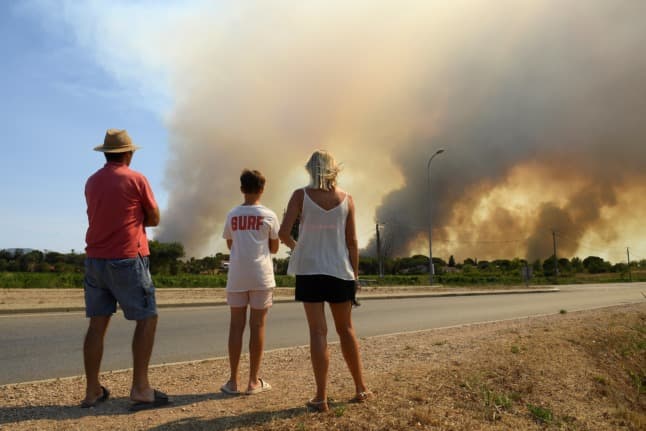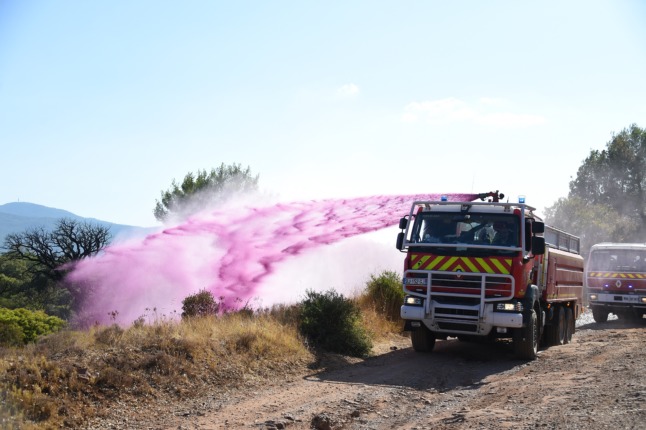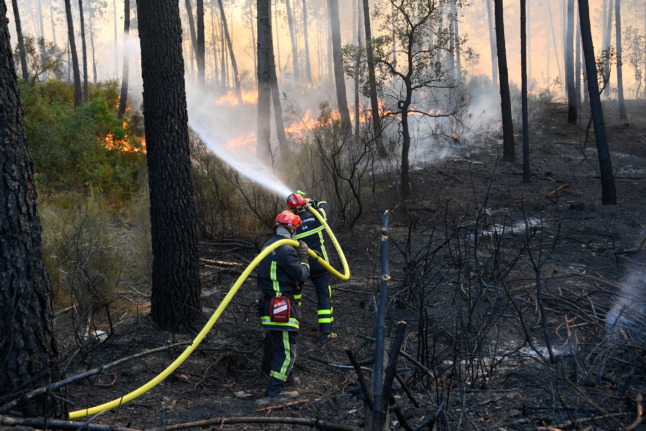Weekend winds 'risk worsening' French Riviera fire

Firefighters battling France's worst wildfire of the summer fear changing winds over the weekend could make it harder to battle the blaze that has already burned for four days.
"We're expecting risky days" ahead, Florent Dossetti of the Var département fire brigade told AFP. Already dozens of people have been treated for the effects of smoke inhalation and at least two people have died in the areas affected by the fire.
But he added that there had been fewer flareups on Thursday than the day before, with firefighting planes and helicopters dumping water on new blazes to aid colleagues on the ground.

Firefighters spray fire-retardant during the wildfire in the region department of Var. Photo: Sylvain THOMAS / AFP.
Around 1,200 firefighters and 250 fire engines worked through the night to tamp down the flames along an 80-kilometre front, the Var prefecture said on Thursday. It added that the situation "remains very unstable" in parts of the affected area, with 7,100 hectares of forest already burned.
READ ALSO What to do if you see a wildfire in France
Flames have ripped through the arid Plaine des Maures nature reserve towards the glitzy Riviera resort of Saint-Tropez.
Firefighters on Thursday appealed for information about how the fire began, with current theories suggesting it started at a motorway rest stop on Monday.
Around 10,000 residents and holidaymakers have been evacuated in the area, with only a fraction able to return to campsites late Wednesday while others remained in emergency accommodation.
The prefecture urged evacuees to "above all avoid returning to your home or the place you were holidaying".

Firefighters spray water on a wildfire, in Vidauban in the department of Var. Photo: NICOLAS TUCAT / AFP.
Beyond the human impact, local producers of rosé wine fear an economic blow from destroyed vines, while an operation to save protected local tortoises has been under way in the Maures nature reserve.
The fire is the latest in the Mediterranean region that has also seen major blazes claim lives in Greece, Turkey, Italy and Algeria in recent weeks, with numerous officials blaming climate change.
The region has long faced seasonal wildfires linked to the dry and hot summer weather, but climate scientists warn they will become increasingly common because of man-made global warming.
Comments
See Also
"We're expecting risky days" ahead, Florent Dossetti of the Var département fire brigade told AFP. Already dozens of people have been treated for the effects of smoke inhalation and at least two people have died in the areas affected by the fire.
But he added that there had been fewer flareups on Thursday than the day before, with firefighting planes and helicopters dumping water on new blazes to aid colleagues on the ground.

Around 1,200 firefighters and 250 fire engines worked through the night to tamp down the flames along an 80-kilometre front, the Var prefecture said on Thursday. It added that the situation "remains very unstable" in parts of the affected area, with 7,100 hectares of forest already burned.
READ ALSO What to do if you see a wildfire in France
Flames have ripped through the arid Plaine des Maures nature reserve towards the glitzy Riviera resort of Saint-Tropez.
Firefighters on Thursday appealed for information about how the fire began, with current theories suggesting it started at a motorway rest stop on Monday.
Around 10,000 residents and holidaymakers have been evacuated in the area, with only a fraction able to return to campsites late Wednesday while others remained in emergency accommodation.
The prefecture urged evacuees to "above all avoid returning to your home or the place you were holidaying".

Beyond the human impact, local producers of rosé wine fear an economic blow from destroyed vines, while an operation to save protected local tortoises has been under way in the Maures nature reserve.
The fire is the latest in the Mediterranean region that has also seen major blazes claim lives in Greece, Turkey, Italy and Algeria in recent weeks, with numerous officials blaming climate change.
The region has long faced seasonal wildfires linked to the dry and hot summer weather, but climate scientists warn they will become increasingly common because of man-made global warming.
Join the conversation in our comments section below. Share your own views and experience and if you have a question or suggestion for our journalists then email us at [email protected].
Please keep comments civil, constructive and on topic – and make sure to read our terms of use before getting involved.
Please log in here to leave a comment.